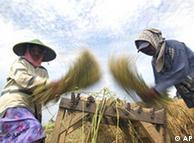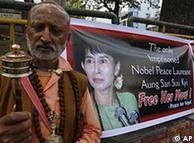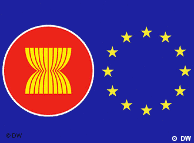A bilateral free trade agreement (FTA) between the European Union and the Association of Southeast Asian Nations (ASEAN) is a top priority at the meeting in the Cambodian capital Phnom Penh.
The two sides launched negotiations for a FTA in 2007. However, talks were halted earlier this month.
"Negotiations haven't gone on well and there's a pause now for each side to reflect," said Paul Lim from the European Institute for Asian Studies in Brussels.
"I think this EU-ASEAN free trade agreement is one of the biggest challenges in the relationship," Lim said.
Enrique Valerdi Rodriguez from the Elcano Royal Institute in Madrid said such trade agreements had significant implications for developing countries.
"They certainly have potential to provide them with new trading opportunities, lock in reform and be powerful tools for economic growth," Rodriguez said in a paper published earlier this year.
 Bildunterschrift: Großansicht des Bildes mit der Bildunterschrift: Southeast Asian nations feature various degrees of development
Bildunterschrift: Großansicht des Bildes mit der Bildunterschrift: Southeast Asian nations feature various degrees of development
"However, liberalization between countries with vastly different levels of development, if it is too fast and too deep, could be very damaging for the weakest part," he said.
According to Rodriguez, protection measures such as tariffs, subsidies or state intervention could protect developing nations' infant industries until they are strong enough to compete internationally.
Yet ASEAN nations are interested in building stronger economic ties to the European Union, Lim said.
"In view of the financial crisis, they are keen for more financial cooperation," Lim said. "All of the economies depend on exports to the US and Europe. Economic interest of ASEAN to the EU has always been there."
But security matters would also be on the agenda.
"Since September 11, things have changed and this has put security on the agenda," Lim said. "This is in both sides' interest."
Burma also an issue
The EU-ASEAN ministerial meeting comes on the heels of the Asia-Europe Meeting (ASEM) Foreign Ministers' Conference in Hanoi, Vietnam, on Monday and Tuesday.
Participating delegations had agreed to focus the Hanoi meeting on political issues and concentrate more on economic, security and environment topics in Cambodia.
 Bildunterschrift: Großansicht des Bildes mit der Bildunterschrift: Protestors are calling for Suu Kyi's release
Bildunterschrift: Großansicht des Bildes mit der Bildunterschrift: Protestors are calling for Suu Kyi's release
However, the trial of Burmese pro-democracy leader and Nobel Peace Prize winner Aung San Suu Kyi will also be an issue in Phnom Penh, said a spokeswoman from the German foreign ministry.
"Human rights issues in Burma are not explicitly on the agenda, but will most certainly be addressed," she said. Burma is one of the members of ASEAN, in addition to Brunei, Cambodia, Indonesia, Laos, Malaysia, Philippines, Singapore, Thailand and Vietnam.
According to Lim, the views on Burma have become a common factor for both sides.
"There has been a lot of progress in relations," Lim said. "Now with Burma, they're both on the same side. In the past, it was an obstacle to relations."
Lim said talks between the two sides had developed significantly since their initial dialogue in the early 1970s.
"It took a long time for the EU to tell ASEAN that economic dialogue isn't enough, we have to have a critical dialogue as well," Lim said.
In addition, ASEAN nations wanted more attention from the EU, he said.
"At this point in time, EU-China relations seem to overshadow all other relations the EU has with Asia," Lim said. Yet ASEAN countries do not want to be left out.
ASEM criticizes Burmese government
In a statement issued at the conclusion of the ASEM meeting in Vietnam, the ministers urged Burma to free detainees and lift political restrictions. Sweden's foreign minister Carl Bildt said the wording had gone beyond anything previously endorsed by China or Vietnam.
"I think it's a major step forward," Bildt said. "It's a substantial increase on the political pressure on the regime in Burma."
Jan Kohout, the foreign minister of the Czech Republic, which holds the rotating EU presidency, said in his closing remarks that Suu Kyi was an "indispensible partner in the dialogue leading to national reconciliation."
"She should be released immediately and the Burmese government should engage in an inclusive dialogue with all relevant political and ethnic groups," Kohout said.
A separate statement issued at the conclusion of the ASEM meeting also addressed the underground nuclear test conducted by North Korea on Monday. European and Asian foreign ministers said they "condemned" the action.
It described the test as a "clear violation" of six-party agreements and relevant United Nations Security Council resolutions, calling on Pyongyang to "immediately return" to six-party talks with regional powers.
Author: Sabina Casagrande
Editor: Susan Houlton


No comments:
Post a Comment